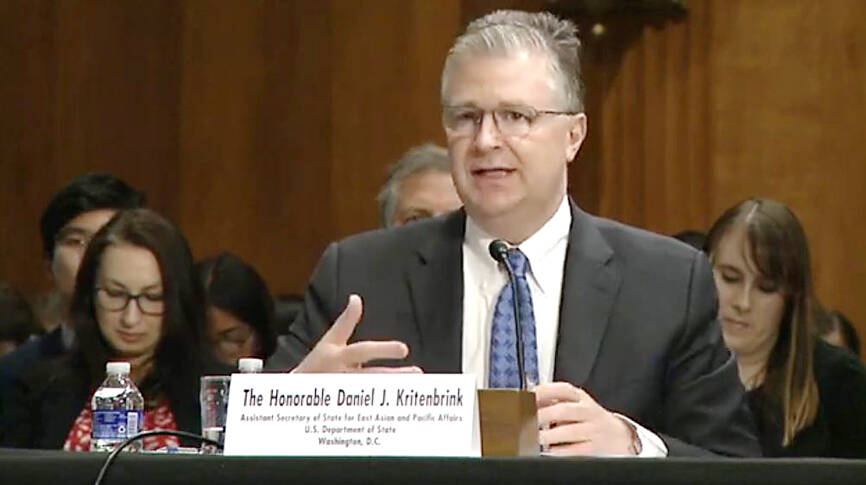The US has warned Taiwan’s diplomatic allies in the Pacific to be “cautious and careful” in dealing with China, US Assistant Secretary of State for East Asian and Pacific Affairs Daniel Kritenbrink told US senators on Thursday, adding that Washington is working closely with them to maintain stability and prosperity in the region, despite Beijing’s influence.
The US Senate Committee on Foreign Relations held a hearing on “US Strategy in the Pacific Islands Region” on to discuss effective solutions to “push back” against Beijing’s influence, said US Senator Jim Risch, a ranking member of the committee.
China is seeking “to erode longstanding US partnerships in the region,” such as proposing untransparent infrastructure projects and pressuring Taiwan’s diplomatic allies to switch ties to Beijing, US Assistant Secretary of Defense for Indo-Pacific Security Affairs Ely Ratner said.

Photo: screen grab from US Senator Jim Risch’s YouTube channel
The Pacific islands are vulnerable to influence from China, which “has moved aggressively to assert itself” in the region, Kritenbrink said.
The US Congress last week renewed the Compacts of Free Association, providing Micronesia, the Marshall Islands and Palau with assistance on the economy, defense and other fields.
The assistance provided under the compacts “are key to maintaining the stability and prosperity of our closest Pacific island partners, and to safeguarding our shared long-term defense and strategic interests in the region,” he said.
Three Pacific island nations have switched recognition from Taiwan to China in the past six years: the Solomon Islands and Kiribati in 2019, and Narau earlier this year.
Beijing lured away Taiwan’s allies with economic inducements, and “misused and misinterpreted” UN General Assembly Resolution 2758, Kritenbrink said.
He called on US allies “to be careful and clear-eyed about entering these arrangements with China.”
“China will often make many promises that remain unfulfilled, and that can have negative consequences,” he said.
The US is working “very carefully and closely” with Taiwan’s three remaining allies in the Pacific — Palau, the Marshall Islands and Tuvalu — “to close off any opportunities that China could exploit,” he added.
There is precedent for nations to switch recognition back and forth between Beijing and Taipei, Kritenbrink said, adding that the US is not aiming to force nations to choose their diplomatic allies, but to ensure their “ability to make their own sovereign decisions, free from coercion.”
The US urges nations “to be cautious and careful given the track record of the PRC” while considering switching ties, he said, referring to the People’s Republic of China.
To counter China’s expansion in the Pacific, the US has to “be present [and] to be active in all of these countries,” Kritenbrink said.
Following the opening of new embassies in the Solomon Islands and in Tonga, the US is soon to open another in Vanuatu and is seeking parliamentary approval for the establishment of an embassy in Kiribati, he said.
In Taipei, the Ministry of Foreign Affairs yesterday thanked US officials for voicing concern over Chinese coercion and encouraged other nations to do the same.

AGING: As of last month, people aged 65 or older accounted for 20.06 percent of the total population and the number of couples who got married fell by 18,685 from 2024 Taiwan has surpassed South Korea as the country least willing to have children, with an annual crude birthrate of 4.62 per 1,000 people, Ministry of the Interior data showed yesterday. The nation was previously ranked the second-lowest country in terms of total fertility rate, or the average number of children a woman has in her lifetime. However, South Korea’s fertility rate began to recover from 2023, with total fertility rate rising from 0.72 and estimated to reach 0.82 to 0.85 by last year, and the crude birthrate projected at 6.7 per 1,000 people. Japan’s crude birthrate was projected to fall below six,

Conflict with Taiwan could leave China with “massive economic disruption, catastrophic military losses, significant social unrest, and devastating sanctions,” a US think tank said in a report released on Monday. The German Marshall Fund released a report titled If China Attacks Taiwan: The Consequences for China of “Minor Conflict” and “Major War” Scenarios. The report details the “massive” economic, military, social and international costs to China in the event of a minor conflict or major war with Taiwan, estimating that the Chinese People’s Liberation Army (PLA) could sustain losses of more than half of its active-duty ground forces, including 100,000 troops. Understanding Chinese

US President Donald Trump in an interview with the New York Times published on Thursday said that “it’s up to” Chinese President Xi Jinping (習近平) what China does on Taiwan, but that he would be “very unhappy” with a change in the “status quo.” “He [Xi] considers it to be a part of China, and that’s up to him what he’s going to be doing, but I’ve expressed to him that I would be very unhappy if he did that, and I don’t think he’ll do that. I hope he doesn’t do that,” Trump said. Trump made the comments in the context

SELF-DEFENSE: Tokyo has accelerated its spending goal and its defense minister said the nation needs to discuss whether it should develop nuclear-powered submarines China is ramping up objections to what it sees as Japan’s desire to acquire nuclear weapons, despite Tokyo’s longstanding renunciation of such arms, deepening another fissure in the two neighbors’ increasingly tense ties. In what appears to be a concerted effort, China’s foreign and defense ministries issued statements on Thursday condemning alleged remilitarism efforts by Tokyo. The remarks came as two of the country’s top think tanks jointly issued a 29-page report framing actions by “right-wing forces” in Japan as posing a “serious threat” to world peace. While that report did not define “right-wing forces,” the Chinese Ministry of Foreign Affairs was